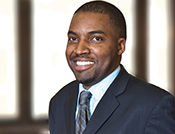Pitt Legal Scholar Charles C. Jalloh Participates in U.N. Thematic Debate
University of Pittsburgh Assistant Professor of Law Charles Chernor Jalloh was invited to participate as a panelist in a daylong thematic debate April 10 at the United Nations Headquarters in New York City. The theme of the debate—which was convened by the president of the 67th session of the United Nations General Assembly, His Excellency Vuk Jeremić from the Republic of Serbia—was the role of international criminal law in justice and reconciliation.
An international criminal law scholar and leading expert on issues of transitional justice, especially as they pertain to Africa,  Jalloh commented on a proposal, launched by the 50-plus-nation African Union, of an African criminal court to address war crimes, genocide, and crimes against humanity—all crimes within the jurisdiction of the permanent Hague-based International Criminal Court (ICC). The proposal has raised questions about the compatibility of the proposed chamber with the ICC’s Rome Statute, which 122 countries (34 of whom are African States) have accepted.
Jalloh commented on a proposal, launched by the 50-plus-nation African Union, of an African criminal court to address war crimes, genocide, and crimes against humanity—all crimes within the jurisdiction of the permanent Hague-based International Criminal Court (ICC). The proposal has raised questions about the compatibility of the proposed chamber with the ICC’s Rome Statute, which 122 countries (34 of whom are African States) have accepted.
“The African Union (AU) proposal to create a criminal chamber within the African Court of Justice and Human Rights has attracted largely negative scholarly reaction,” said Jalloh. “Part of the reason is that the idea raises profound questions about its compatibility with the Rome Statute of the ICC, as well as concerns about the potential fragmentation of an international criminal law regime centered around the world’s first and only permanent international penal tribunal.”
The proposal also has been criticized because it challenges the current conception of the international criminal justice system, which is predicated on the belief that states, not necessarily regional bodies, are the first lines of defense against impunity. “Given the controversial AU proposal, the question now is what, if any, the appropriate role is, or should be, for regional or even subregional bodies in the global fight to ensure that perpetrators do not escape punishment for international crimes,” said Jalloh.
More than 400 delegates from 193 countries participated in the session, which included opening remarks from Jeremić and from UN Secretary General Ban Ki-moon; a high-level morning session during which UN member and observer states formally addressed the debate; two consecutive afternoon panels, titled “Justice” and “Reconciliation,” respectively; and closing remarks. Jalloh served on the “Justice” panel.
Joining Jalloh as “Justice” panelists were John D. Ciorciari, assistant professor of public policy, Gerald R. Ford School of Public Policy, the University of Michigan; retired Canadian Forces Major-General Lewis MacKenzie, who served as a member of the UN Protection Force in Yugoslavia; and Savo Strbac, director of the Veritas Documentation Center, Serbia. Each panelist delivered statements in his respective area of expertise; following these presentations, there was an interactive audience debate moderated by Matthew Parish, a partner in the Geneva office of the international law firm Holman Fenwick Willan.
“It is an honor for me personally, and for the Pitt School of Law as a whole, that I was asked by the president of the United Nations General Assembly to share the outcome of my research on this question,” said Jalloh. “The invitation stands as a testament to the cutting-edge research with real-world impact that we do here at Pitt Law and the groundbreaking work that faculty colleagues engage in daily in this and other units of the University of Pittsburgh.”
Jalloh is an authority on criminal law, international criminal law, international human rights law, and international humanitarian law. His recent scholarship has focused on questions of jurisdiction and selectivity in international criminal law, including, in particular, the tense relationship between Africa and the International Criminal Court, the definition of crimes against humanity in international law, and a comparative study of the exercise of the right of self-representation by persons accused of the worst crimes known to U.S. and international law.
Other Stories From This Issue
On the Freedom Road

Follow a group of Pitt students on the Returning to the Roots of Civil Rights bus tour, a nine-day, 2,300-mile journey crisscrossing five states.
Day 1: The Awakening
Day 2: Deep Impressions
Day 3: Music, Montgomery, and More
Day 4: Looking Back, Looking Forward
Day 5: Learning to Remember
Day 6: The Mountaintop
Day 7: Slavery and Beyond
Day 8: Lessons to Bring Home
Day 9: Final Lessons

